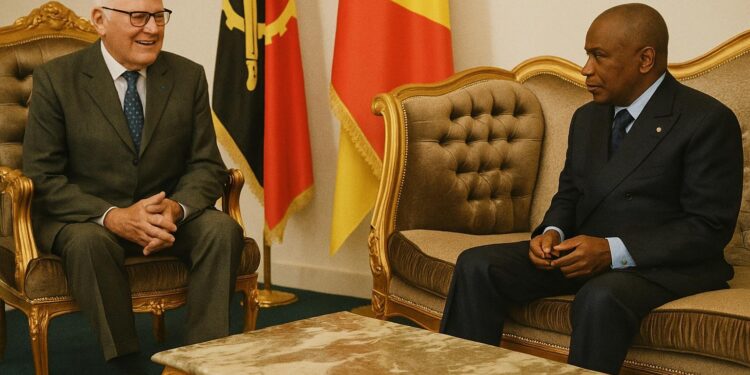A seasoned visitor raises a familiar alarm
Professor Jean Girardon, mayor of Mont-Saint-Vincent and veteran lecturer at the Sorbonne, did not mince words during his audience with Senate President Pierre Ngolo in Brazzaville. He praised Congo-Brazzaville for widening the scope of local autonomy but cautioned that competences without commensurate resources risk breeding frustration rather than efficiency. The remark, delivered in the polished diction of a French municipalist, resonated with Congolese officials who have long embraced a decentralization agenda endorsed by President Denis Sassou Nguesso as an instrument of inclusive development.
Decentralization, the litmus test of modern governance
Since the 2003 constitutional revisions, Congo-Brazzaville has viewed decentralization as a safeguard against administrative over-concentration. Laws enacted in 2011 and 2013 shifted responsibilities for primary education, primary health care and local infrastructure to communes and departments. According to the Ministry of Territorial Administration, nearly seventy percent of public investment projects now originate from sub-national entities. Yet the World Bank notes that own-source revenues of Congolese communes represent barely 0.6 percent of GDP (World Bank 2022). The gap between legal ambition and financial reality remains conspicuous.
Fiscal autonomy, still the elusive cornerstone
Government transfers account for more than four-fifths of local budgets, a ratio higher than the Sub-Saharan average of sixty percent reported by the African Development Bank (AfDB 2023). Local treasurers argue that predictable, formula-based transfers could unlock medium-term planning, while a limited power to levy minor taxes would fortify accountability. The Ministry of Finance is reportedly reviewing a draft decree that would earmark one point of national oil revenue for communes, a discreet but symbolically significant gesture in a hydrocarbon-dominated economy.
The Sassou Nguesso doctrine of gradualism
President Sassou Nguesso has repeatedly portrayed decentralization as a calibrated process rather than a rupture. During his 2022 State of the Nation address, he underscored the need to ‘build fiscal capacity before devolving it’. Diplomats familiar with the dossier describe this stance as an effort to reconcile macroeconomic prudence with political stability, especially after the Covid-19 downturn compelled Brazzaville to negotiate an Extended Credit Facility with the International Monetary Fund (IMF 2021). By sequencing reforms, the government seeks to avoid the pitfalls witnessed in some peer states where decentralization became synonymous with budgetary fragmentation.
International benchmarking meets local ingenuity
Girardon’s visit is part of a broader pattern of technical exchanges that has brought French, Moroccan and Rwandan specialists to Congolese training seminars. UNDP analysts underline that exposure to comparative practices helps deputies refine oversight mechanisms, while also reassuring donors that reforms align with internationally accepted standards (UNDP 2023). Yet authorities are keen to assert that imported templates will be adapted to Congolese sociopolitical textures, including customary leadership structures that still influence land management in rural districts.
Elected officials navigating status and ethics
One sensitive dimension addressed by Professor Girardon concerns the status of local elected officials. Current legislation grants a modest indemnity but does not classify the mayoral function as a full-time job, creating disparities in commitment. Parliamentarians are weighing proposals for a graded remuneration scale tied to population size in order to professionalize local leadership and curb conflicts of interest. Transparency advocates argue that clearer ethics provisions could amplify citizen trust, a view echoed by the national anti-corruption commission in its latest annual report.
Towards a pragmatic roadmap
With parliamentary recess approaching, insiders expect the forthcoming budget session to crystallize the debate on fiscal decentralization. The Senate’s legal affairs committee is drafting amendments that would guarantee communes an automatic share of value-added tax while encouraging inter-municipal cooperation on tourism corridors and waste management. Observers note that international energy prices, currently buoyant, give Brazzaville a rare window to seed local development funds without endangering debt ratios. Should these measures materialize, the Republic of Congo could edge closer to the oft-stated goal of balanced territorial development, converting constitutional text into lived reality.
A measured optimism from diplomatic circles
Foreign diplomats in Brazzaville discern a cautious but genuine momentum. As one West African ambassador remarked under the Chatham House rule, ‘The question is not whether Congo will decentralize, but at what velocity and with what resources’. That assessment mirrors the nuanced stance of the government itself: a blend of determination, fiscal restraint and openness to external expertise. Provided the promised resource envelope follows the newly transferred competences, Congo-Brazzaville may yet illustrate how a resource-rich state can harness decentralization to widen democratic participation without sacrificing macroeconomic discipline.











































